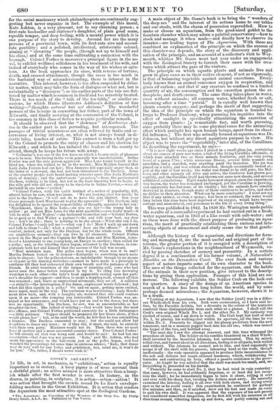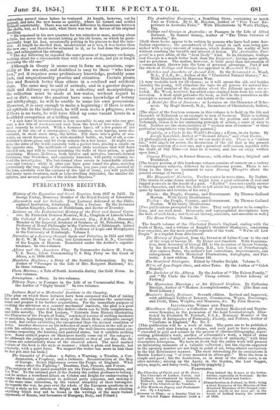G OSSE'S AQUARIUM. *
Is life, in art, in mechanics, in "exhibitions," action is equally important as in oratory. A busy pigmy is of more account than a slothful giant ; an active minnow is more attractive than a lump- ish whale after the first wonder is over. In history, in the drama, in painting, in sculpture, it is action—action—action ! It was action that brought the crowds round De La Rue's envelope- folding machine in the Great Exhibition. It is action that renders the Aquarium the most attractive spot at the Zoological Gardens.
• The Aquarium: an Unveiling of the Wonders of the Deep Sea. By Philip Henry Gosse, A.L.S., &e. Published by Van 1 oorst. A main object of Mr. Gosse's book is to bring the " wonders of
the deep sea " and the interest of its actions home to our tables and our stools, with the charm of possession superadded. How to make or choose an aquarium, from the good-sized goblet to the fountain chamber which may adorn a palatial conservatory—how to stock and manage it when made—and finally how to observe its inmates—are leading topics of The Aquarium. With these are combined an explanation of the principle on which the success of this chamber-sea depends, the story of the discovery and appli- cation of the principle, and an account of a collector's visit to Wey- mouth, whither Mr. Gosse went last year under an engagement with the Zoological Society to furnish their cases with the crea- tures which attract the gaze of the visitors.
The principle on which aquatic plants and animals live and grow in glass cases as in their native element, if not so vigorously, is that of balancing vegetable against animal excretions. Every-
body knows that an animal consumes oxygen in respiration, and gives off carbon ; and that if any creature be confined to a limited quantity of air, the consumption and the excretion poison the at- mosphere, and death ensues. The same thing takes place in water, even without animals; all common water, whether fresh or salt, becoming after a time "putrid." It is equally well known that plants excrete oxygen ; and perhaps the merit of first suggesting the idea of the principle on which the aquarium is founded be- longs to Professor Daubeny, when pursuing his inquiries into the effect of sunlight in specifically stimulating the excretion of oxygen from plants : [a remarkable fact, and worth pursuing, since probably there may be some physical cause for the animating effect which sunlight has upon human beings, apart from its cheer- ful influence.] The first who actually formed an aquarium was Dr. Johnson, but without any direct aquarium purpose in view. His object was to prove the " vegetability," inter alia, of the Corallines. In describing the experiment, he says-
" It is now eight weeks ago since I placed in a small glass jar, containing about six ounces of pure sea-water, a tuft of the living Corallina officinalis, to
which were attached two or three minute Confervm, and the very young frond of a green Elva; while numerous Itissom, several little mussels and annelides, and a star-fish, were crawling amid the branches. The jar was placed on a table, and was seldom disturbed, though occasionally looked at ;
and at the end of four weeks, the water was found to be still pure, the Mel- lusca and other animals all alive and active, the Confervie had grown per-
ceptibly, and the Coralline itself had thrown out some new shoots, and several additional articulations. Eight weeks have now elapsed since the experiment was begun, the water has remained unchanged, yet the Coralline is growing, and apparently has lost none of its vitality ; but the animals have sensibly decreased in numbers, though many of them continue to be active, and show no dislike to their situation. What can be more conclusive ? I need not say that if any animal, or even a sponge, had been so confined, the water would long before this time have been deprived of its oxygen, would have become corrupt and ammoniacal, and poisonous to the life of every living thing."
This was published in 1842. In 1850 Mr. Warington made public the results of a successful experiment he had carried out in a fresh- water aquarium, and in 1852 of a like result with salt-water ; and as these were done with the direct purpose of producing an aqua- rium, the merit of practically establishing these curious and inte- resting objects of amusement and study seems due to that gentle- man.
Although the history of the aquarium, and directions for form- ing and managing it, are the most useful and original part of the volume, the greater portion of it is occupied with a description of Mr. Gosse's explorations in the neighbourhood of Weymouth, va- ried by passing sketches of scenery and peasantry. In a certain degree it is a continuation of his former volume, A Naturalist's Rambles on the Devonshire Coast. The ever fresh and various aspect of nature imparts some of its own character to the book. The uses of the things collected for the aquarium, and the habits of the animals in their new position, give interest to the descrip- tions by giving them application. Passages of this kind are nu- merous. The following exhibits the Soldier Crab on the look-out for quarters. A story of the doings of an American species in search of a house has been long before the world, and by some perhaps deemed miraculous; the Aquarium, however, shows it to be a truth.
"Looking at my Aquarium, I saw that the Soldier [crab] was in a differ- ent Whelk-shell from his own. Both were surmounted, as I have said be- fore, by the Parasitic Actinia, but a diversity in the colour of the tentacles rendered these distinguishable from each other at a glance. I shall call the Crab's own original Whelk No. 1, and the other No. 2. My curiosity was
excited of course, and I sat down to watch. The Crab kept fast hold of shell No. 1, by placing his walking-feet within its aperture„all the time he was within No. 2. Presently he slipped out his plump posteriors from the new tenement, and in a moment popped back into his old one, which was indeed the larger of the two, and hobbled away.
"The next day I saw the attempt renewed, and this time witnessed the procedure ab initio. The Soldier on his rambles blundered on a third Whelk-
shell invested by the beautiful Adamsia, but untenanted. This he seized, rolled over, and turned about in all directions, feeling it in all parts, both within and without. The Adamsia he seemed not to like, and tried repeatedly to scrape it off the shell with his pincers, labouring hard at the work, though ineffectually : the rude operation appeared to produce little inconvenience to the soft and delicate but tough-skinned Anemone, which, withdrawing its tentacles and contracting its body, offered a passive resistance to the perse- cutor. At length he was satisfied that the shell was much too small, and, re- linquishing it, proceeded on his travels. "Presently he came to shell No. 2, that he bad tried in vain yesterday: that essay, however, he had evidently forgotten, or at least did not recog- nize the shell ; for he immediately began to turn it about, rolling it over and over with his sharp feet, twisting the Actinia most awry. Ile carefully examined the interior, feeling it all over with both claws, and trying every spot as far as he could reach : this examination he continued for perhaps five minutes, and then, as if satisfied, drew out his feet and made an essay to quit his own shell. It was apparent that the exposure of his soft person was considered somewhat dangerous, for he first felt with his antenme in all directions around, vibrating them up and down, and partly coming out and retreating several times before he ventured. At length, however, out he rapped, and into the new house as quickly, where he turned and settled himself comfortably. There was not much difference in dimensions between the shells, but, as I have said, what there was WSS in favour of his original dwelling.
"He remained in his new quarters for ten minutes or more, moving about a little, but never for an instant letting go his old house, on which he perti- naciously kept his feet, occasionally putting in his pincers to feel the inte- rior. At length he decided that, inconvenient as it was, it was better than the new one ; and therefore he returned to it, as he had done the previous day, and relinquished the attempt.
"'The day following he repeated the same process of temporary exchange, walking about for a considerable time with his new abode, and yet at length resuming the old one."
Although in theory it seems easy to form an aquarium, espe- cially at the sea-side, and doubtless is easy to those "who know how," yet it requires some preliminary knowledge, probably some luck, and unquestionably practice and attention. Certain plants live and flourish better than others in a confined and artificial state. The same may be said of animals, and in a greater degree. Skill and delicacy are required in collecting and manipulating; the collection must be made at low-water, without regard to wet or dirt ; unless the amateur have some knowledge of botany and ichthyology, he will be unable to name his own possessions. however, it is easy enough to make a beginning : if there is natu- ral aptitude in the individual, he will soon make a pfogress; even if there is no taste, he will have filled up some vacant hours in a healthful occupation at a trifling cost.
"A rich fund of entertainment is very accessible to any one who can pro- cure a few bits of weed-covered rock from the level of low-water. They need scarcely be selected. With a hammer knock off a few points of the stones, of the size of a crown-piece; the rougher, more leprous, more dis- coloured, in short more dirty, the better. Put them into a globe of sea- water, an uncut decanter, or a wide-mouthed bottle, or, best of all, a con- fectioner's show-glass, and let them remain for a few hours. At night exa- mine the sides of the bottle carefully with a pocket leds, placing a candle on the opposite side. The multitude of curious little creatures that will have crawled out, and will be found mounting the walls of their prison, is quite surprising. Minute Molluscs, both bivalve and univalve, uncouth-formed Crustacea, tiny Starfishes, and cepecially Annelida, will pretty certainly re- ward the investigator. The last.named class occurs in remarkable abund- ance and variety ; while if, after you have gone round the glass, noticing particularly the very edge of the surface-line, you pass your eye, assisted by the lens, carefully over the surfaces of the bits of stone, you will probably find many more creatures, such as tube-dwelling Annelides, the smaller Zo- ophytes, and several species of the delicate Bryozoa."



































 Previous page
Previous page